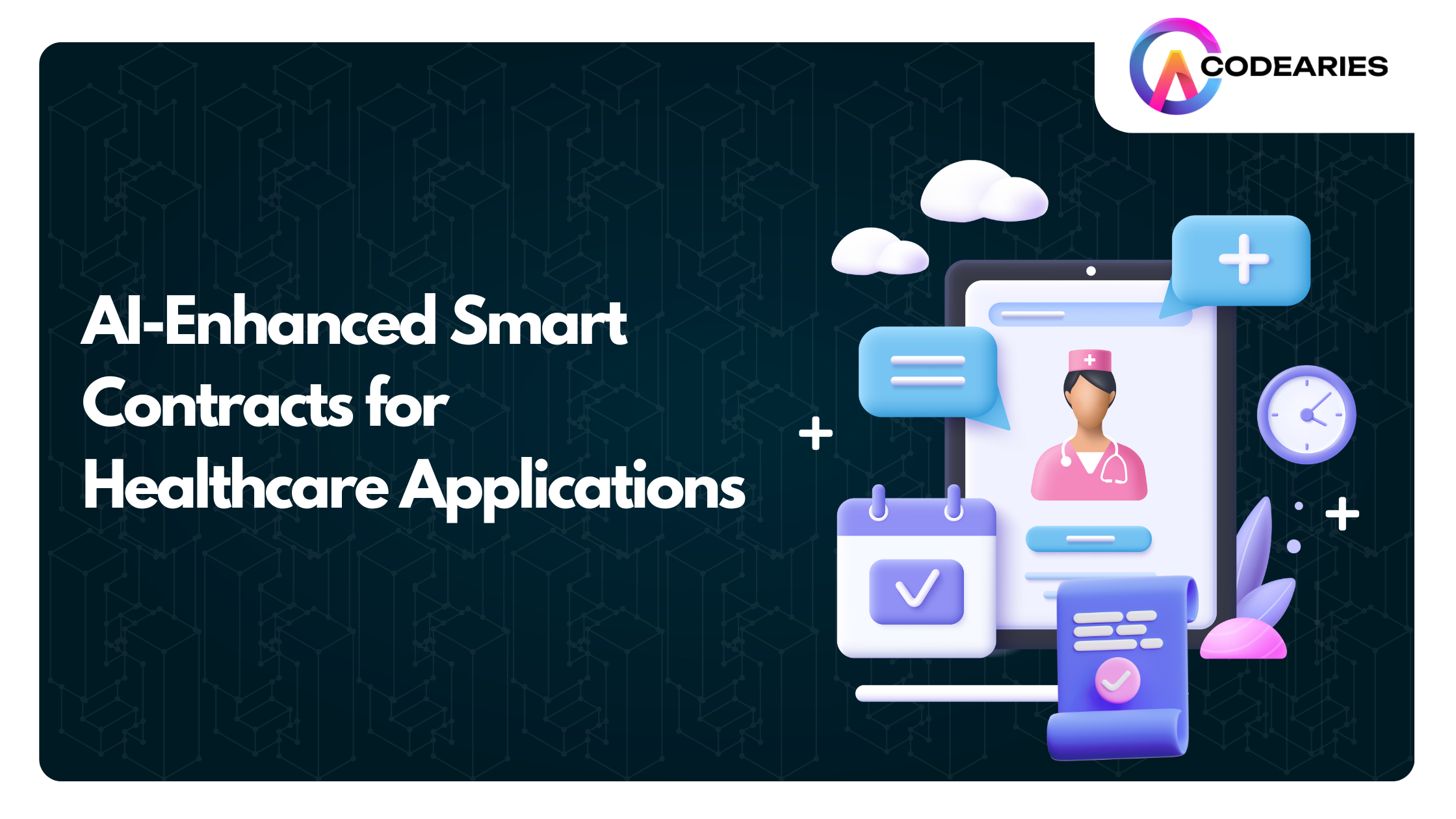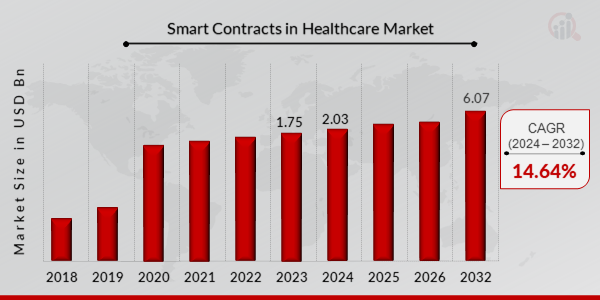
The healthcare industry is undergoing a significant transformation driven by technological advancements. Among the most impactful innovations is the integration of Artificial Intelligence (AI) with blockchain-based smart contracts. This combination is revolutionizing healthcare by enhancing transparency, automating processes, and improving patient care. As healthcare systems worldwide face inefficiencies, administrative burdens, and rising costs, AI-enhanced smart contracts offer a promising solution to these challenges.
This article explores how this technology is reshaping healthcare applications, highlighting its benefits, real-world applications, and potential future developments.
What are AI-Enhanced Smart Contracts?
are self-executing agreements with terms written directly into code. They automatically enforce and execute the agreed-upon terms when certain conditions are met. For example, a smart contract automatically triggers a payment when a healthcare service is rendered and verified.
Integrating AI into these contracts enhances their capabilities. AI can analyze vast datasets, predict outcomes, and optimize contract performance. AI-enhanced smart contracts in healthcare not only automate the execution of agreements but also leverage machine learning algorithms to detect anomalies, adjust terms, and ensure compliance with evolving regulations. This integration reduces human error, enhances security, and removes the need for intermediaries, creating a transparent and efficient system for handling complex healthcare interactions.
The Role of Blockchain in Smart Contracts for Healthcare
Blockchain technology, renowned for its decentralized and immutable characteristics, holds transformative potential for the healthcare sector. When integrated with smart contracts, this technology can drive significant advancements across various healthcare applications. The Smart Contracts in Healthcare Market is projected to grow from USD 2.03 billion in 2024 to USD 6.07 billion by 2032, exhibiting a compound annual growth rate (CAGR) of 14.64% during the forecast period (2024 – 2032). Additionally, the market size for smart contracts in healthcare Here’s an exploration of how blockchain enhances smart contracts in healthcare:
-
Enhanced Security and Transparency in Data Sharing
-
-
- Patient Data Management: Blockchain ensures that patient medical records are stored securely and shared transparently, preserving data integrity and protecting against unauthorized access.
- Improved Interoperability: Smart contracts facilitate the smooth exchange of data between diverse healthcare providers, enhancing coordination and reducing the likelihood of medical errors.
-
-
Optimized Supply Chain Management
-
-
- Drug Traceability: Blockchain provides a transparent ledger for tracking pharmaceuticals from production to distribution, helping to combat counterfeiting and confirm the legitimacy of medications.
- Medical Device Authentication: Smart contracts can validate the authenticity and history of medical devices, mitigating the risk of using counterfeit or defective products.
-
-
Reinforced Clinical Trials Integrity
-
-
- Data Reliability: Recording clinical trial data on an immutable blockchain minimizes the risk of tampering, enhancing the credibility of research outcomes.
- Streamlined Patient Consent: Smart contracts automate the consent process for clinical trials, ensuring transparent management of patient agreements and adherence to ethical standards.
-
-
Efficient Insurance Claims Management
-
-
- Fraud Detection: Blockchain’s transparent and auditable ledger helps in identifying and preventing fraudulent insurance claims by providing a clear record of transactions.
- Automated Claims Processing: Smart contracts can automate the insurance claims process, significantly cutting down on administrative work and enhancing overall efficiency.
-
-
Streamlined Healthcare Payments
-
- Secure Transactions: Blockchain facilitates secure and efficient payment systems within healthcare, reducing the chances of fraud and ensuring prompt reimbursement.
- Micropayment Capabilities: Smart contracts enable the handling of micropayments for various healthcare services, offering more flexible payment arrangements.
AI-Enhanced Smart Contracts in Healthcare: A Transformative Innovation
AI-enhanced smart contracts are set to transform the healthcare sector by automating workflows, boosting operational efficiency, and reinforcing data security. Merging the capabilities of blockchain technology with artificial intelligence, these smart contracts offer solutions to many pressing issues within healthcare systems.
Key Advantages of AI-Enhanced Smart Contracts in Healthcare
- Automation of Routine Tasks: AI can streamline repetitive processes such as processing claims, managing patient appointments, and overseeing medication distribution. This automation alleviates administrative workload and enhances operational efficiency.
- Elevated Data Security: Blockchain technology ensures that medical records are immutable and secure, safeguarding patient confidentiality and mitigating the risk of data breaches.
- Enhanced Decision Support: AI algorithms are adept at analyzing extensive medical data, providing insights that support more precise diagnoses and the creation of personalized treatment plans.
- Optimized Supply Chain Management: Smart contracts can oversee the entire journey of medical supplies and equipment, from manufacturing to healthcare providers, ensuring transparency and minimizing the risk of counterfeit goods.
- Accelerated Clinical Trials: AI can expedite various aspects of clinical trials, including participant recruitment, data gathering, and analysis, thus speeding up the introduction of new treatments and therapies.
Applications of AI-Enhanced Smart Contracts in Healthcare
- Patient Consent Management: Smart contracts can automate obtaining and managing patient consent for medical procedures, ensuring compliance with legal standards and fostering transparency.
- Medication Oversight: AI-driven smart contracts can monitor prescription details, refills, and adherence, helping to minimize medication errors and improve patient care.
- Streamlined Payments: These contracts can automate financial transactions between healthcare providers and insurers, cutting administrative expenses and facilitating prompt payments.
- Remote Patient Monitoring: AI-enabled smart contracts can continuously monitor patient health indicators remotely, enabling early detection of issues and timely intervention.
- Collaborative Research: Smart contracts can simplify collaboration between researchers and healthcare professionals by managing data sharing and protecting intellectual property.
Smart Contracts in Telemedicine
The rise of telemedicine presents new opportunities and challenges. AI-enhanced smart contracts can support secure and automated remote healthcare delivery by managing patient consent, verifying identities, and automating billing processes. This ensures that telemedicine services are provided efficiently and transparently.
AI and Smart Contracts in Insurance and Billing
In the healthcare sector, insurance fraud represents a significant challenge, resulting in considerable financial losses for insurers and providers. Traditional fraud detection methods are often cumbersome and error-prone. AI-enhanced smart contracts provide a promising alternative, offering a more efficient and precise solution.
Key Benefits of AI-Enhanced Smart Contracts in Insurance and Billing
- Automated Verification: AI-enhanced smart contracts streamline the verification process for insurance claims, ensuring payments are issued only for legitimate services. This reduces the incidence of fraudulent claims and simplifies the claims workflow.
- Real-Time Fraud Detection: Leveraging AI, these smart contracts can process and analyze vast amounts of claims data instantly. This capability allows for the early identification of irregular patterns and potential fraud, enabling proactive measures to prevent financial losses.
- Increased Transparency and Accountability: By maintaining a clear, auditable record of all transactions, smart contracts ensure transparency and consistency. This visibility helps deter fraudulent activities and enhances accountability across the system.
- Reduced Administrative Load: Automating key tasks in claims processing and billing with smart contracts significantly lessens the administrative burden on healthcare providers and insurers, leading to more efficient operations and resource allocation.
- Enhanced Patient Experience: Faster and more accurate claims processing translates into quicker reimbursements and fewer administrative issues for patients, improving their overall experience with the healthcare system.
How It Works
- Claim Submission: Upon submission, a smart contract verifies the legitimacy of the claim and confirms the insurance coverage.
- Data Analysis: AI algorithms scrutinize various data elements, including patient details, provider information, and treatment codes, to detect discrepancies or suspicious activities.
- Fraud Detection: AI flags potentially fraudulent claims for experts to review manually.
- Automated Payments: The smart contract processes valid claims automatically, reducing the need for manual intervention.
The Future of AI-Enhanced Smart Contracts in Healthcare
AI-enhanced smart contracts are set to transform healthcare by boosting efficiency, security, and patient care. Key trends and future predictions include:
- Wider Adoption: More sectors, from hospitals to insurers, will implement these smart contracts as their benefits become clearer.
- Advanced AI: Enhanced AI will allow for more sophisticated tasks like in-depth data analysis and personalized treatment recommendations.
- IoT Integration: Combining AI, smart contracts, and IoT devices will enable real-time health monitoring and preventive care.
- Regulatory Frameworks: New regulations will be needed to address data privacy, security, and compliance issues.
- Ethical Considerations: Issues like bias and transparency will need to be managed carefully.
Future Applications
- Personalized Medicine: Tailored treatment plans based on comprehensive data.
- Drug Development: Faster identification of drug candidates.
- Supply Chain Transparency: Improved traceability and quality assurance for medical products.
- Healthcare Marketplaces: Efficient and transparent connections between patients and providers.
- Preventive Care: Proactive health monitoring to reduce costs.
Conclusion: The Promise of AI-Enhanced Smart Contracts
AI-enhanced smart contracts hold the potential to transform healthcare by improving efficiency, security, and transparency. As technology continues to evolve, the integration of AI and blockchain in healthcare promises to deliver significant benefits and drive innovation across the industry.
FAQs About AI-Enhanced Smart Contracts for Healthcare
What is a real example of a smart contract?
A real example of a smart contract is the Ethereum-based smart contract used in the ICO (Initial Coin Offering) process. This contract automatically manages the issuance of tokens to investors based on predefined rules, such as the amount of cryptocurrency sent and the timing of the investment. It ensures that tokens are distributed securely and transparently, without the need for intermediaries.
How could AI be used to improve smart contracts?
AI can enhance smart contracts by automating complex decision-making processes and optimizing contract terms based on data analysis. For instance, AI algorithms can predict potential issues, detect anomalies, and adjust contract conditions in real-time. This leads to more efficient execution and management of contracts, as well as better compliance with dynamic regulations.
What is the role of AI in contract management?
AI plays a significant role in contract management by automating tasks such as contract drafting, monitoring compliance, and managing renewals. AI-powered tools can analyze contract data to identify risks, track key performance indicators, and ensure adherence to terms. This streamlines contract administration and enhances accuracy, reducing the likelihood of errors and disputes.
What will AI look like in 2024?
In 2024, AI is expected to be more advanced and integrated into various aspects of daily life and business.
It will feature improved natural language processing for more intuitive human-computer interactions. Enhanced machine learning algorithms will offer better predictive capabilities. Greater automation will handle complex tasks more efficiently. AI will play a crucial role in personalized medicine, autonomous systems, and intelligent decision-making. It will provide more sophisticated and adaptive solutions.


